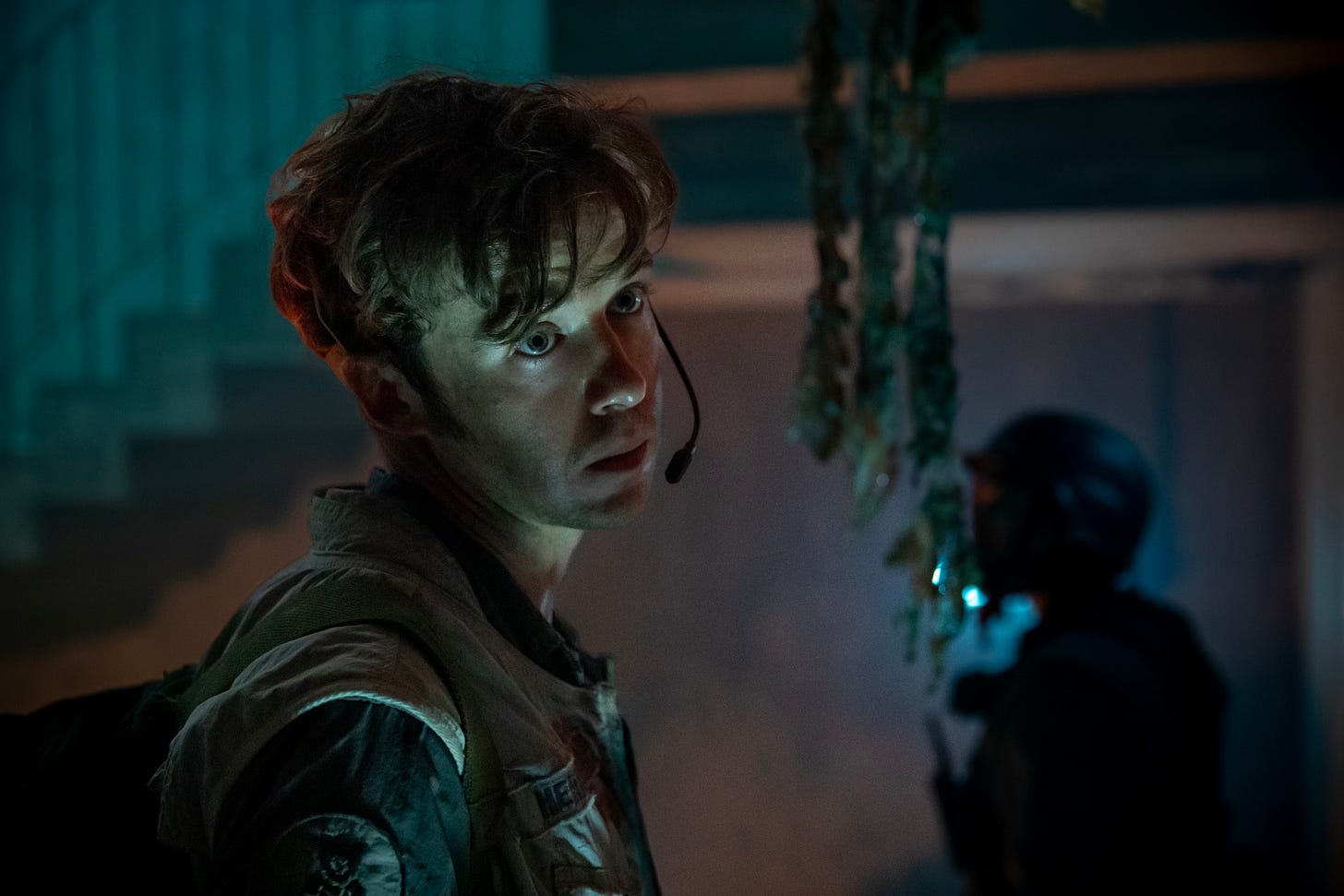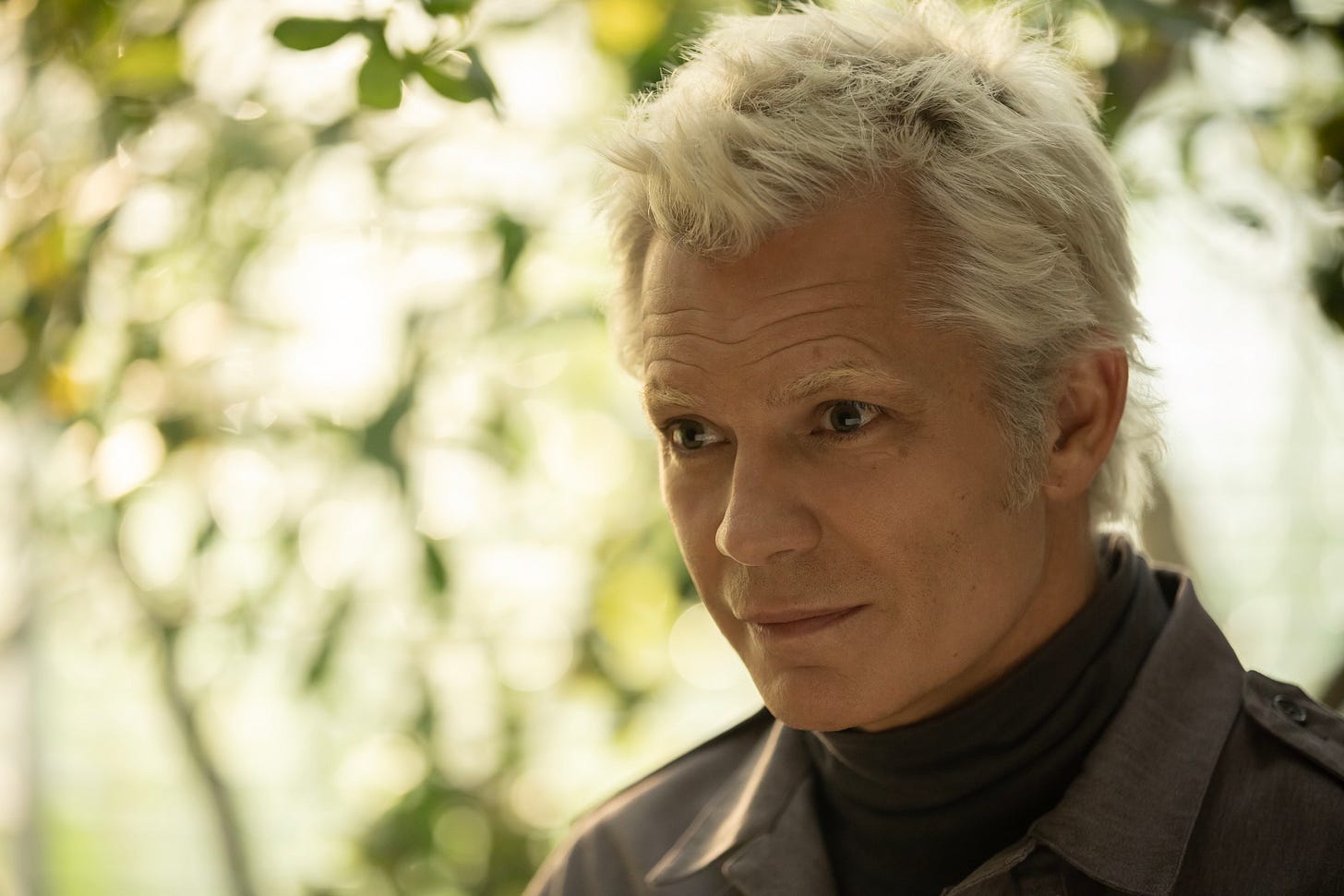'Alien: Earth' S1E01 & E02 Review | "Neverland" & "Mr. October"
Noah Hawley's new series opens on the edge between extinction and eternity.

[This review contains spoilers for the first two episodes of Alien: Earth, “Neverland” and “Mr. October”]
The Alien franchise is, fittingly, an odd beast. Ridley Scott’s original 1979 picture is a haunted house horror film set in space, while James Cameron’s 1986 sequel is an exhilarating action flick. Both movies are rightly considered classics, but efforts to continue the franchise have been met with a mixed response. Studio meddling tarnished David Fincher’s incredibly bleak Alien 3, and Jean-Pierre Jeunet’s Alien Resurrection never seems to have a firm grip on its tone or plotting. Then you have two Alien vs. Predator movies, neither of which is particularly good, before you have Scott returning to the franchise with the prequels Prometheus and Alien: Covenant. Both films use the fearsome xenomorph to kill some dumb humans, but that seems more like a studio concession on Scott’s part as he’s far more interested in the malevolent android David functioning as a Satan figure in a sci-fi Paradise Lost. Last summer, the franchise (now under the Disney umbrella after the purchase of 20th Century Fox) had a reboot of sorts with Alien: Romulus, which returned to the haunted house roots but could at times get bogged down in too many overt homages to earlier movies.
What then to make of the first Alien TV series, Alien: Earth, from Fargo showrunner Noah Hawley? From its first two episodes, Hawley seems like the ideal choice. Just as he took the Coen Brothers’ beloved 1996 movie and successfully reinvented it for long-form storytelling, he has cleverly expanded the world of the 1979 film while also incorporating elements from other parts of the franchise to create a story that feels fresh and captivating. Moreover, rather than a game of “spot the Easter Egg,” Hawley’s series is more concerned with the larger themes and ideas of the franchise, honoring their concepts more than specific moments or characters.
The series premiere, “Neverland,” throws a lot of information at the viewer before settling into its larger plotting. Set two years before the events of Alien, we’re told that beyond the synthetics we saw in the original movies (e.g., Ash, Bishop), there are also cyborgs (augmented humans) as well as hybrids (human consciousnesses uploaded into synthetic bodies, a la Altered Carbon). Whichever company can control how human consciousness is extended will ultimately control the future.
The show then puts us onto two tracks. First, there’s the doomed voyage of the USS Maginot, a Weyland-Yutani vessel transporting alien species. The crew’s security officer, Morrow (Babou Ceesay), engineers a crash on Earth after the rest of the crew is killed by alien species (it’s implied that Morrow also engineered the release of the aliens on board and the deaths of his crewmates). The whole concept plays as, “What if Ash had been successful in acting on behalf of Weyland-Yutani in Alien?”
Down on Earth in “New Siam,” we see the exploits of Prodigy, the youngest of the five companies that run the planet. New Siam is a company town, and Prodigy is run by Boy Kavalier (Samuel Blenkin), whose name kind of tells you all you need to know about his personality. Kavalier is working on creating the first hybrids, taking terminally ill children and uploading their consciousness into synthetic bodies. The first experiment with a hybrid named Wendy—set at Prodigy’s “Neverland” facility—is a success, and now as a 12-year-old in a body that’s not only an adult but essentially superpowered (she’s stronger, faster, etc.), Wendy (Sydney Chandler) leads five other children through the process. Although this process saves the children’s lives, it also raises the spectre that Kavalier has found a way to cheat death.

Death comes to his doorstep when the Maginot crashes in New Siam with the alien species and Morrow still on board. Since companies now function like nations, Prodigy sends in a search-and-rescue team. Among that team is the young medic, “Hermit” (Alex Lawther), who also happens to be Wendy’s brother. Hermit is unaware she’s not only alive, but now lives in an adult synthetic body. Watching the footage of the crash, Wendy sees that her brother is on the search-and-rescue team, and wants to reunite with him. She volunteers herself and her fellow hybrids for the mission, and a curious Kavalier agrees. He sends along their synthetic overseer/trainer Kirsh (Timothy Olyphant) to supervise the mission, and the group heads into the wreckage, unaware that the xenomorph and other space monsters are on board.
That’s admittedly a lot of setup, but Hawley handles it well. This is not a series that’s going to spend eight episodes setting the table before we briefly glimpse the xenomorph in the closing moments of the season finale. Instead, Hawley is doing a bit of remixing and reinvention to set clear stakes and larger ideas. We’re still operating largely in the haunted house of the original (the downed Maginot in place of the Nostromo) with touches of Aliens’ space marines serving as xenomorph fodder with the hapless human search-and-rescue team. Everything with the hybrids is more on the side of Prometheus/Alien: Covenant in that the questions revolve around humanity’s limitations and a need to play god. There’s even a bit of Alien: Romulus and its sibling bond with Wendy and Hermit clearly functioning as the emotional center of the story.
What sets these first two episodes off on the right foot is that Hawley moves our expectations away from “How many people will the xenomorph kill?” and uses the longform format to explore larger questions that would struggle to fit inside a typical Alien movie. The biggest example of this is the brewing conflict between Weyland-Yutani and Prodigy. It doesn’t seem like an accident that the Maginot happened to crash in the territory belonging to the hot new player on the world stage, and Prodigy is on the cutting edge of technology that promises immortality. Both companies are playing god, and now it’s a bunch of humans and hybrids caught in the middle.
Prodigy’s machinations seem particularly sinister when you consider how they’re taking children with nothing to lose, separating them from their old lives, and shoving them into adult bodies. Everything with Prodigy feels particularly current with our callous, immature tech CEOs who claim that they’re building a better future while exploiting children to do (e.g., data mining minors’ social media to feed into A.I. models). To send the hybrids into a search-and-rescue mission feels particularly egregious considering they all have the minds of pre-teens (and the adult actors do a terrific job of playing the emotional immaturity of their characters), but are expected to function in a hazardous environment. But that’s the concept: if you’ve conquered death, why would you value life?
While the corporate war between Weyland-Yutani and Prodigy hovers at the outskirts of the story, the center of the action delivers on the promise of “There are aliens, they’re on Earth, and they will mess you up.” Perhaps the biggest question I have is how exactly the xenomorph situation gets resolved. A larger threat looming over the four Ellen Ripley (Sigourney Weaver) movies is that if the xenomorph arrives on Earth, it will wipe out the human population, so our characters must do everything they can to prevent that outcome. Placing a xenomorph on Earth in this series doesn’t necessarily deflate those stakes, but also we know that the xenomorph doesn’t succeed if only because Weyland-Yutani keeps trying to get one in the Ripley movies.

But that doesn’t mean we’re without stakes, even if the xenomorph is perhaps destined to lose. The hybrids are Hawley’s cleverest touch as it finds a way to endanger children (a callback to Newt in Aliens) without having literal children running around a spaceship. It oddly gives the show the best of both worlds as Hawley can endanger the hybrid characters and make us care for them without the icky feeling of watching a xenomorph off a bunch of children (it’s possible all the hybrids survive, but I doubt it; however, they’re all still up and running at the end of the second episode).
Most importantly, the emotional stakes are centered on Wendy and Hermit, and again, Hawley makes sure not to waste our time by keeping their bond a secret from each other. By the end of “Mr. October,” Wendy and Hermit know they’re siblings, and when Hermit gets pulled down into an abyss by the xenomorph for a second time (a bad day at the office for Hermit), we care about Wendy going to rescue him. While there’s a lot of intrigue and space horror in the show, Hawley ensures that this isn’t just a bloodbath.
Arguably, the weakest part of the first two episodes is everything involving Morrow, who currently seems more like a plot device than a character. He’s cold, remote, and ruthless, and most of his scenes involve him going somewhere, some alien is nearby, and he uses it to eliminate a human. If Wendy and her crew represent the promise of eternity, then Morrow is an avatar for extermination, bringing death with him wherever he goes. However, all of this carnage doesn’t appear to affect him, so he becomes a vehicle for ripping apart some nameless humans. I hope we’ll get a bit more development on him in the weeks to come, but for now, his scenes are the driest of the show.
But even in these weak scenes, you can see that Disney spared no expense in bringing this sci-fi horror to streaming. The show carries a reported budget of $250 million, and that appears to be all on screen with stunning production design, costumes, and alien VFX that could sit right alongside those in Alien: Romulus. Alien: Earth is built like an event series, but it doesn’t use its franchise bona fides to coast on the goodwill of fans. Hawley appears determined to approach Alien in a way that is both visually and tonally familiar while bringing new ideas to the franchise.
Because that’s the big challenge with this series: the xenomorphs themselves are not that interesting. To quote Warden Andrews from Alien 3, “it's an 8-foot creature of some kind with acid for blood, and it arrived on your spaceship. It kills on sight, and is generally unpleasant.” If you center the xenomorph, you have a slasher film. You have to use it as impetus for the plot, but build ideas around the creature. Whether it’s the anti-capitalist sentiment of the original film or the sibling bond present in Alien: Romulus, the fight for survival has to be about something more than running from the monster. Hawley appears to understand that, which is why he’s got multiple plates spinning in the first two episodes.
From “Neverland” and “Mr. October,” I would say Alien: Earth is a massive success if only because it’s able to match its ambition with rock-solid storytelling. There are a few things in the opening half-hour or so that are slightly confusing, but the show is not built to confound. More importantly, while other expensive IP prequel series like House of the Dragon and Rings of Power dragged audiences along through tedious first seasons of endless table setting, Alien: Earth is already off and running with clear stakes, propulsive storytelling, and interesting characters. I’m eager to see how this tale unfolds outside of space, where no one can hear you scream.
Stray observations:
Even when Hawley gets a bit heavy-handed, the show knows how to have fun, such as in one scene where the search-and-rescue team comes across a party of wealthy folks dressed like French aristocrats who can’t be bothered to leave their crumbling building. That’s a scene where, aside from the clear subtext, you say, “Do your thing, xenomorph.”
Placing the hybrids into the spaceship is interesting because while we’ve seen that synthetics are not necessarily a match for the xenomorphs, we’ve also never seen synthetics that appear superpowered. It makes me wonder if we’re in for an odd battle royale of sorts where it’s hybrids versus aliens.
The show does a good job of channeling the tone of the original Alien by playing as a slow burn. I’m pleasantly surprised that it blends so well with the more action-oriented stuff you’d see from Aliens, but those scenes tend to function more as brief bits of punctuation in between the creeping dread of claustrophobic corridors.
Olyphant doesn’t take center stage as I expected, but he’s still a lot of fun in the first two episodes. His biting commentary feels like a necessary note in between the naïvety of the hybrids and the casual callousness of the corporate overlords.
Alien: Earth airs Tuesday nights at 8pm ET on Hulu. Look for recaps of the latest episodes here within the next day. Matt Goldberg is a film critic who lives and works in Atlanta. If you enjoyed this review, check out his newsletter, Commentary Track.

great article and a great start to this new series - it really felt authentically like the Alien universe that got us all hooked in the first place.